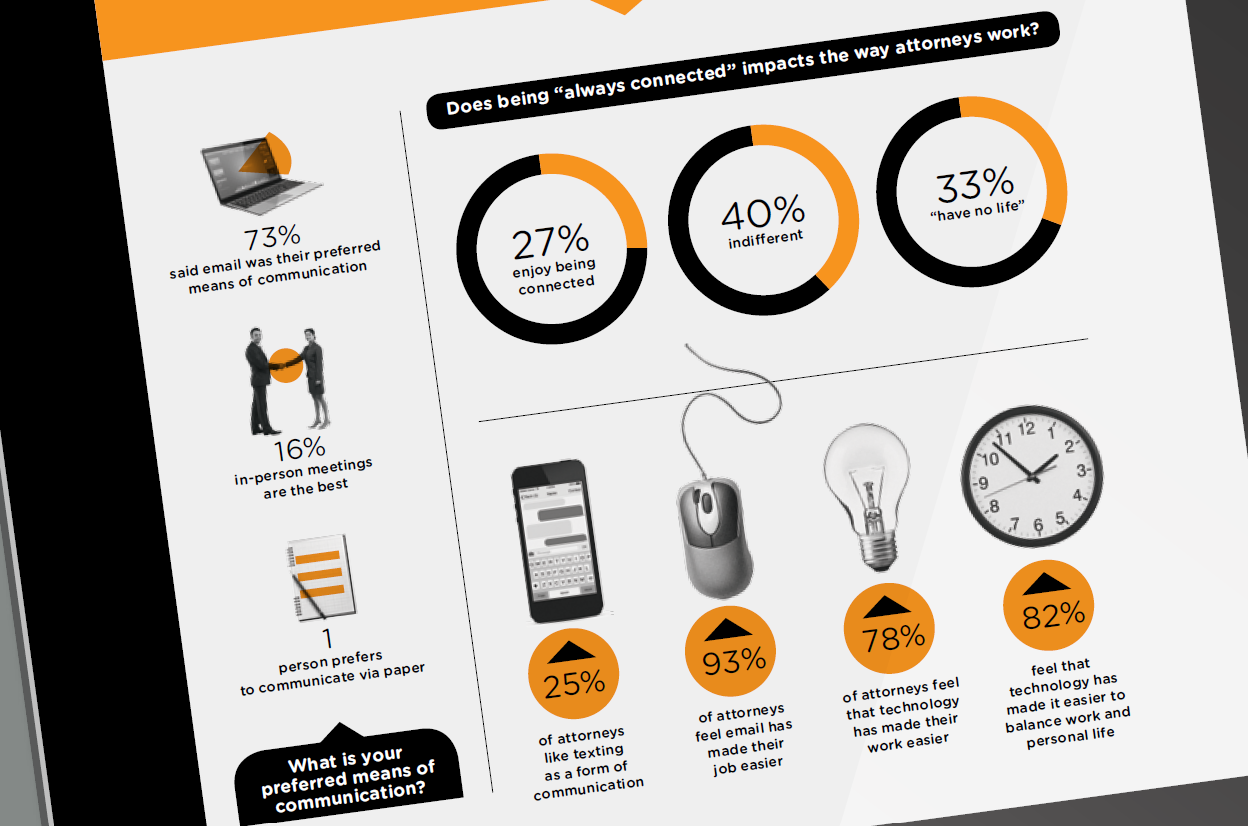
CHEAT SHEET
- Growing pains. While email, texting and office chat networks increase efficiency, they instill in attorneys the pressure of constant connection.
- End of the ‘mommy track’ career. The increasing accessibility that tech has granted attorneys has eroded some of the preconceptions around young female associates.
- Technology immigrants versus natives. Feel no shame in being a latecomer to the information revolution; if you are already embedded, remember to unplug occasionally.
- Embrace the change. Keep and build upon the technology solutions that work for you, and feel no qualms about discarding those that hinder you.
Have you ever wondered what it must have felt like to be a lawyer when the industrial revolution was happening and the world was changing so dramatically? Oddly, our experiences with change may be similar to those who experienced the industrial revolution. We are in the midst of a similar technological revolution — the information revolution. Yes, technologically, the information revolution is in full swing, but in the legal field, we are experiencing the pains of technological evolution.
We all know that there is a significant difference between people who started using technology as adults, and those who grew up using technology. Today’s toddlers expect something with a flat surface — like an iPad — to interact with them when they pick it up. This was not the experience of the toddlers of the 1970s. Can you imagine a world without Facebook, Google and LinkedIn? Many of us remember that world. The movie “Back to the Future Part II” predicted fax machines as the height of technological advancements, but today, fax machines are archaic. Computers with interconnectivity via dial-up access to the Internet saw the true beginning of the information revolution in 1993, at the fast (at that time) modem speed of 56 kbps (kilobits per second) or in today’s context 0.056 mbps (megabits per second). To put this in context, the new technology permitted us to download a single song in 1993 in about 15 minutes. Today, downloading the same song would take about a second.
There are many examples of how technology has changed our culture and our societal expectations, but this article is focused specifically on the changes seen in the legal world. The practice of law has changed dramatically. Even though the changes brought by the information revolution cannot be undone, it seems worthwhile to gain perspective on how the information revolution has changed the practice of law, and whether the changes are good, bad or neutral.
Anecdotally, it is widely believed that millennials (those who reached adulthood at the latest turn of the century) are changing the culture of law firms. Millennials tend to expect to be always connected and in exchange, they seek and expect more flexible balancing between work expectations and personal time. This expectation differs radically from the traditional law firm environment of years ago, when all attorneys were expected to be at the office at least on Monday through Friday from 9 am to 5 pm, and often considerably later. When pressing a deadline, attorneys would work together at the office late at night and sometimes into the early morning hours. Today 24/7 office access is important and available as a convenience, but it is now unusual to see large teams working at the office after hours as part of regular business. Along the way, some millennials (and others) swapped higher salaries for work/life balancing. Today, many working lawyers attain better work/life balance by leveraging technology to participate in personal pursuits, yet remain available for work when needed. Sometimes, work intrudes on personal time, and at other times, work during “normal” business hours gives way to personal pursuits. Technology provides a viable route for these work/life balancing efforts.
Likewise, it seems that technology also has been eroding the so-called “mommy track.” Previously, when an associate became a mother, there was a perception that she would not be adequately available to obtain the training and business development skills necessary to attain partnership on time, or the experience and availability to serve as general counsel. Large numbers of talented women left the practice of law in order to spend time raising their children. Others remained as practicing attorneys but sacrificed, at least for a time, the pursuit of partnership or general counsel to raise their children. Many women left the practice of law for a time or opted for reduced hours in order to spend more time with their children, and this choice was called the “mommy track.” Many mothers avoided the mommy track by putting in the necessary face time to meet their career goals, sometimes making sacrifices in raising their children. New mothers also endured considerable stress and unhappiness associated with these suboptimal options.
This work/life balancing challenge tends to be most visible with lawyers who are parents, but the challenge obviously also exists for others who need or want a better work/life balancing to meet family needs like caring for an elderly or chronically ill family member, or pursuing personal passions requiring flexibility. Today, lawyers with children and others who want more flexible personal time increasingly have good options provided by technology. With the ability to work just about anywhere and the abounding amount of information at one’s fingertips, attorneys can now follow a standard path to partnership whether or not they become parents, have significant other family needs, or pursue personal passions that require flexibility. Similarly, parents (not just mothers) are able to attend more family events, and lawyers with passions beyond the practice of law can participate during traditional business hours as necessary, knowing that they are just a beep or buzz away from work if needed. Modern technology permits better work/life balance for many attorneys, but it has also substantially eroded downtime when lawyers are not available for work.
We wondered whether the anecdotes about technology and the practice of law accurately represent the value technology brings to lawyers. To evaluate this issue, we used one of the tools of the information age — SurveyMonkey®. Using SurveyMonkey and various social media, we obtained survey results from 205 individuals. The results are analyzed below. In addition, we wanted to gain a sense of how these changes have impacted women, since work/life balancing issues traditionally have been more visible for women. Toward that end, we interviewed three female in-house attorneys for a personal perspective.
Survey: Lawyers and technology
It is no surprise that 78 percent of attorneys feel that technology has made their work easier. Interestingly, 18 percent indicated that their work is neither harder nor easier, just different. Yet even more, 82 percent feel that technology has made it easier to balance work and personal life, such as enabling flexible work arrangements or working remotely. However, when asked whether being “always connected” impacts the way attorneys work, 40 percent were indifferent. Twenty-seven percent leaned towards enjoying being connected while 33 percent slanted in the direction of feeling they “have no life.” At each extreme (“I have no personal life” and “I love being always connected”), the respondents were all female except one, with most of the love for connection from in-house counsel. A majority of the respondents who felt they had no personal life were law firm attorneys, and with the exception of the one male, all had practiced five years or less.
When looking at specific technology, overwhelmingly, email is the technology that 93 percent of attorneys feel has made their job easier, although only 73 percent selected email as their preferred means of communication. One person prefers to communicate via paper, while 16 percent of respondents still maintain that in-person meetings are the best form of communication.
When considering specific technology, after email, the types of technology that attorneys feel have made their lives easier are smart phones, laptops, scanners, portable media (USBs, etc.) and online file sharing. Respondents were allowed to submit open responses to this question, and three technologies that were named multiple times as making jobs easier were tablets, online research and electronic file submissions.
One use of technology that 25 percent of respondents like is texting. Anticipating this, we looked at texting in more detail. When attorneys were asked if texting was professionally acceptable, nearly half said no. A third feel it is acceptable to text among peers, while 15 percent think it always is acceptable to text. A small minority of respondents feel that professional texting is appropriate, but only with clients. Most of these respondents were female and in-house counsel, with an average time in practice of 24 years.
Respondents were asked to “describe in as few words as possible how [they] feel technology has changed/impacted the way [they] work or what [they] see.” We analyzed this information to find the most frequent responses. Without going into a scientific analysis, there are some generalities to be made.
Technology has helped attorneys in their careers
On the benefit side of technology, we have some specific examples where technology contributes to someone’s career. One attorney writes that as a deaf attorney, technology has enabled him to be a practicing attorney. Another states that as a former solo practitioner and the founder of a new firm, technology has allowed him to build client relationships. One attributes his job to technology, because he learned e-discovery and computer forensics in law school. Similarly, others pointed out that their career fields only exist because of technology — they are privacy attorneys.
Technology is both a benefit and a burden
In this regard, the benefits of technology are easily seen in the ability to research online, file motions and responses electronically, and share information easily and quickly. The word “research” was the most frequent substantive word used. Many respondents also like the ability to communicate globally and to be able to leave their desk behind, yet still be able to work. One respondent pointed out that he took this survey on his cell phone. Another respondent attributed her ability to participate in family events to the flexibility associated with responding to emails via her mobile device.
On the other hand, as one respondent writes, work used to be able to be left at the office. Many respondents lamented the burden of email and lack of actual free time. One respondent had this to say:
I need to be accessible much more and always checking emails. Clients want to contact me at all times, even if we can’t advance a project or issue until later. It’s made people more ADD [Attention Deficit Disorder]—always in contact, but not always accomplishing much. On balance, I question how much it has improved the legal practice and businesses.
Another respondent noted that the pressure to “stay connected” may lead to fatigue, and stressed the importance of developing personal skills to learn how to “turn it off.”
Quicker does not mean better
Several respondents indicated that the pressure is on to respond quicker, regardless of time or location. And with the abundance of information available at one’s fingertips, it takes time to sift through the “Google effect.” One respondent writes that “. . . clients and senior attorneys assume everything is online and easy to find, when that might not be the case.” That concern flows over into the expected response that clients, bosses and colleagues expect. Although information may be easier to find and there may be less physical paperwork, clients (be they external or internal) expect responses almost instantaneously. While the information may be more readily available, thinking and formulating the appropriate response with due consideration still takes the same amount of time.
Globalization
The last generalization drawn from the comments is that technology has made the world smaller. Many attorneys now work with colleagues around the globe. One can stay current on news and events, file necessary paperwork and reduce the time needed to exchange communications. Attorneys can work from just about anywhere, although there are a few places some might intentionally go to avoid connectivity, such as cruise ships (not guaranteed for complete disconnectivity, but there is a premium charge for connecting) or climbing Mount Everest. Blind spots do exist, but one must put effort into finding them.
One comment sums up the survey results: “Technology advances have had such a fundamental impact on our lives over the last 20 years that working as a lawyer today is almost a completely different job than it was 20 years ago.”
What do women lawyers have to say?
The three female attorneys interviewed for this article were Nayla Valente, general counsel for Saint-Gobain Construction Products headquartered in Paris La Défense in France, who has practiced for 25 years; Tracy L. Jacobson, corporate counsel for GN Hearing Care Corporation in Glenview, Illinois, who has practiced for nine years, and Casey C. Higgins, trade counsel for Chairman Paul Ryan, Committee on Ways and Means, Subcommittee on Trade of the US House of Representatives in Washington, DC, who has practiced law for four years. The sidebars provide more detailed information about our interviewees, who we thank for their willingness to share their views.
Valente says technology has made her work both easier and harder, but certainly different, depending on the context. As a woman in the legal field, she feels that technology has given her the flexibility to work remotely or at different hours, which is helpful when one has family duties. She sees the benefits of technology in enabling global communication across jurisdictions and time zones, such as email, communication platforms and video conferencing — all of which contribute to faster decision making in projects. Valente believes that whatever the industry or field where lawyers work, technology has changed the work in the same manner. ”We all have to be as reactive and flexible as our businesses need when facing the constantly moving market challenges”, she says.
On the other hand, Jacobson feels that technology has made her work much easier, especially in document work where she can turn drafts, make edits and communicate with attorneys on the other end quickly and easily. When asked for her perspective as a woman, she replied:
“As a woman and a mom of two small kids, technology has added flexibility of my positions. Now I can get almost anything done at home or at any local Starbucks that I can at the office. It allows me to be more present at home when I need to be but also meet the obligations I have at work.”
Higgins finds that technology “definitely made my job easier.” She cites having access to information “at her fingertips” as one of the key benefits of technology, as she quickly can obtain information she needs about pending legislation, Committee hearings, floor action, statutes and online archives to access historical information related to legislation.
Like Valente, Jacobson praises the benefits of technology in helping in-house counsel meet the needs of the business by providing our internal clients better service through our flexibility to meet those needs. Higgins also focuses on service. For Higgins, technology means that she doesn’t have to be at her desk for someone to reach her, nor does her boss have to be at his desk for her to reach him. Instead, through technology, both are accessible “at all times.”
In one respect, two of the women had diverging opinions. When asked if they like being “always connected,” Valente said she does not while Jacobson said “Yes!” Jacobson revealed an example of taking her son to a swim evaluation. Technology enabled her to stay connected to work while at the pool, so that she did not “miss a beat.” In this regard, Valente does see similar benefits:
“Being in a relatively constant link with what is happening in my job allows me to react or intervene rapidly on some topics and this is sometimes beneficial as it can contribute, for instance, to circumventing an issue before it reaches a complex level, or pushing ahead rapidly a project locked up in time constraints, by sometimes answering a question on evenings or weekends. . . . Managing priorities and being able to identify important issues in the flow of the huge amount of information or requests coming in daily through emails, communication platforms, etc. is a fundamental change in the way I organize my work, that technology has brought over the years.”
Higgins sees both benefits and costs to continuous connectivity. She said that:
“I believe that technology makes it more difficult to balance work and life. Because smart phones mean that you are always accessible, you’re always “on the job.” However, it does make it easier to be away from the office at times when your presence otherwise would be required. It’s a double-edged sword.
“I do not prefer to be constantly connected. It has impacted the way I work in that I am never off the clock. Nevertheless, there are times when the ability to be connected has allowed me more time at home. For example, when Congress is debating late into the night, I can go home and watch the debate on C-Span and keep in touch via my smart phone and remote network connection, rather than remaining in the office. “
On a very positive note, Higgins also said that: “I imagine if I have children someday, I will find the ability to be connected outside of the office much more valuable.” This is a hopeful sign that newer lawyers see more opportunities to keep on track with their careers while also parenting or meeting other obligations or life goals. Valente takes an additional step to address continuous connectivity — she actively safeguards time in her day where she is doing something other than checking emails or answering calls.
Looking at the downside of technology, we asked the attorneys for their opinion. Jacobson responds as a true digital native, seeing few drawbacks to our greater reliance on technology citing the benefits she described above — meeting needs through flexibility. Valente sees risks linked to confidentiality along with the huge amount of incoming information that in-house counsel must manage. In her personal view, the most important risk is the risk of losing the capacity to analyze and reflect on topics and instead rely on standards and established automatic processes, which are not always applicable to all situations. Higgins, reflecting the legislative activity that is central to her work, sees data breaches and the vulnerability to attack of power grids and other systems as the greatest drawback of technology.
In closing, all three attorneys had advice for consideration:
- Valente cautions us to be careful not to allow technology to deprive us of our natural human intelligence and questioning capacity. We saw this concern reflected in the survey responses above.
- Jacobson warned us to beware of autocorrect. Author note: The autocorrect feature in text messaging and email on cell phones has created many embarrassing situations. Aside from Jacobson’s experiences, another attorney shared one of her experiences: She had texted someone “I am working remotely from home.” Upon receiving the text response “Hope it pays well,” she realized autocorrect had sent the message “I am working erotically from home.” Sometimes automation creates unanticipated results.
- Higgins hopes that defensive cybersecurity technology will keep pace with the offensive developments. She believes that the US Congress needs to act at a swift pace to make sure our laws reflect changes in the world resulting from technological advances.
It is good advice to keep an eye on the human element, both in preserving thoughtfulness in addition to speed, and in avoiding over-reliance on technology that can create mistakes. Also, remaining aware of vulnerabilities and continuously strengthening defenses — as individuals, organizations and at the governmental level — is necessary as technology continues to change at such a rapid pace.
What does this mean for attorneys?
In looking at both the survey responses and interviews, we see similar lessons. Technology is a tool that we can use wisely, but care must be taken to reasonably limit negative impacts that technology can have on our lives. Technology provides a great amount of flexibility in working environments and puts an incredible amount of power at our fingertips. Yet with great power comes great responsibility… or in this case, with great technology comes great thoughtfulness.
Whether you are a native of the information revolution, or whether you are a technology immigrant who learned to use computerized technology as an adult, technology is here to stay. Most natives multitask and are perpetually connected. Most immigrants appreciate the benefits of technology, but persistently struggle to make ever-changing systems, apps and devices work effectively. Immigrants often feel that things are moving too quickly. Multi-tasking is common and increasingly expected, but immigrants often find that handling one task at a time is more effective. Immigrants also tend to feel that there is insufficient time for reflection and peaceful, uninterrupted thought. Natives feel most comfortable when connected, appreciate the speed with which desired information can be located and used, and often are frustrated that their immigrant colleagues and family members are slow to respond and have challenges using technology.
The interviews and survey results identify challenging aspects of the information revolution, and point to positive aspects of the changes in the practice of law that the information revolution has wrought. Rules, practices and protocols are developing, and change is happening at a very rapid pace. If you are an immigrant in the information revolution, take solace in knowing that it is understandable that you, like anyone using a second language, will face challenges as you work toward fluency. Give yourself a break — it is okay to struggle. Most natives in the information revolution understand that immigrants face challenges that natives don’t face. Most natives are happy to help, even if sometimes there is a bit of impatience. Immigrants gain the most out of the information revolution when they relax, seek help when needed and continuously learn. Natives also can learn from immigrants — unplugging for periods of time can promote deep, clear thinking. Taking a moment to consider carefully before responding or making a decision can improve outcomes. But most of all, when natives and immigrants work together, they tend to form formidable teams!
What works best? We are living in a time of historic change. Embrace the change that has come with the information revolution. Try new things. Keep and build upon that which works well for you, and feel no guilt in rejecting things that do not lighten your load.
We thank our interviewees for sharing their personal experiences, and the ways that their practice of law has been changed by the information revolution. We also thank all of you who participated in the survey. Thank you for sharing your views and contributing to the community of ideas.
One of the best things about the information revolution is the ability to connect in new and meaningful ways. We hope that you find this article useful, and that it inspires you as you ride the wave of change that come with the information revolution. We hope that you will share, with us and others, your thoughts, experiences, challenges and successes with the information revolution.
Nayla Valente
GENERAL COUNSEL
SAINT-GOBAIN CONSTRUCTION PRODUCTS
PARIS LA DÉFENSE – FRANCE
- Years in Practice: 25
- Favorite technological advancement: “The smartphone, definitely.”
- How many phones do you carry? “I have two, one professional and one personal.”
- What piece of technology could you never leave home without? “My mobile phone.”
- Do you tweet? “No.”
- What part of your early work life do you wish you could bring back, or never let go of? “None. I feel satisfied with my work life as it is today. I believe technology, as long as we master it and manage not to let it overwhelm our lives, is a wonderful benefit.”
Tracy L. Jacobson
CORPORATE COUNSEL
GN HEARING CARE CORPORATION
GLENVIEW, IL
- Years in Practice: 9
- Favorite technological advancement? “I love being able to access my emails everywhere I go. I feel so much more involved with what is happening at work — even if I’m out of the office.”
- How many phones do you carry? “Two — good thing I have a large purse!”
- What piece of technology could you never leave home without? “My iPhone. My entire life is literally stored on it!”
- Do you tweet? “No.”
- What part of your early work life do you wish you could bring back, or never let go of? “As an associate at a large law firm, there was such a camaraderie among us. Work was hard — but fun. I don’t think I’ve ever “let go” of this but as my positions have changed, there has been less of an opportunity to connect with fellow attorneys in nonprofessional environments to bounce off ideas and discuss issues.”
Casey Christine Higgins
TRADE COUNSEL, CHAIRMAN PAUL RYAN, COMMITTEE ON WAYS AND MEANS, SUBCOMMITTEE ON TRADE
US HOUSE OF REPRESENTATIVES
WASHINGTON, DC
- Years in Practice: 4
- Favorite technological advancement? “The worldwide web, of course, but the smart phone is my favorite device.”
- How many phones do you carry? “Two.”
- What piece of technology could you never leave home without? “iPhone.”
- Do you tweet? “Yes –– @cchiggins.”
- What part of your early work life do you wish you could bring back, or never let go of? “Not needing to monitor emails after hours or on the weekends.”






